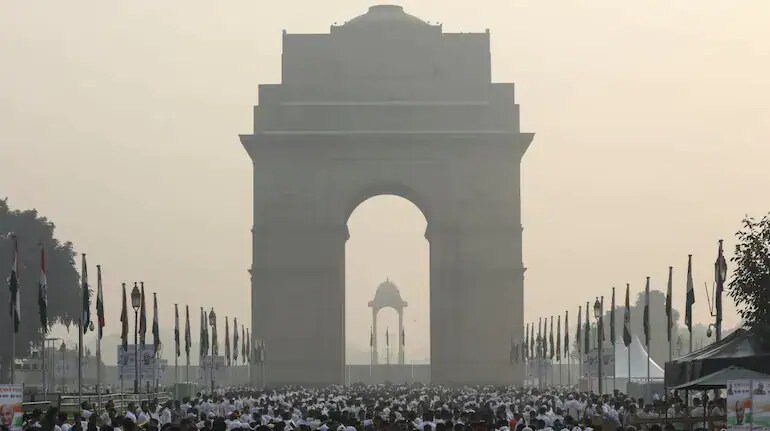CAQM invokes GRAP III banning non-essential construction; possession timelines may get impacted. By Moneycontrol
CAQM invokes GRAP III banning non-essential construction; possession timelines may get impacted
Real estate developers say sites that comply with pollution control regulations should be allowed to continue construction at project sites.

This is the second time that GRAP III has been invoked this winter season. It was first implemented on October 29 but was revoked on November 14.
With the air quality deteriorating to severe levels in the National Capital Region, the Commission for Air Quality Management (CAQM) has invoked Stage III of the Graded Response Action Plan (GRAP), including a ban on all construction and demolition activities in the region. This ‘back-to-back’ ban on construction, said real estate developers, will delay time-bound delivery of projects, impacting both homebuyers and realtors.
They also said that construction sites that comply with pollution control regulations should be allowed to continue construction at project sites
Apart from a ban on all construction and demolition activities, except those of national importance, the measure also includes a ban on BS IV diesel vehicles, shut down of polluting industries and stone crushers.
This is the second time that GRAP III has been invoked this winter season. It was first implemented on October 29, but was revoked on November 14. It was again implemented on December 4 when the air quality entered the severe category. As per the Central Pollution Control Board (CPCB), the air quality index (AQI) of the last 24 hours on December 4 stood at 407 in the severe category.
Impact on real estate sector
Real estate experts and developers said that the ban on construction activities will certainly push the deadlines of residential as well as commercial projects going on in different phases of construction in Delhi-NCR.
According to research by real estate company ANAROCK, over 400,000 homes are at different stages of construction in the Delhi-NCR region. A ban on all construction in the area can delay the projects for three-four months.
In response to the pollution-led ban on construction activities, Santosh Agarwal, CFO and Executive Director, Alpha Corp, said that though it is the responsibility of the builders to take every possible measure to avoid pollution, the authorities should also look for other viable solutions than imposing a complete ban on construction work.
He said it will delay delivery of homes and impact both homebuyers and developers.
"With no construction activity during the majority of past years due to pollution ban and then due to the lockdown, developers are facing consistent delays in delivering projects. Since builders are bound by the RERA timelines, the Commission of Air Quality Management and the government should look for a midway to handle the rising air pollution levels. Also, construction sites that comply with pollution control regulations should be allowed to continue activities at their project sites,” Agarwal told Moneycontrol.
Shauzab Kazmi, Assistant Director at Investors Clinic, a real estate company said that developers will incur revenue losses because of back-to-back ban on construction activities which may get passed on to the fresh consumers.
“The complete ban on most construction activities may lead to a surge in apartment costs for fresh buyers as developers will try to meet their revenue losses incurred due to the ban. Developers have to pay salaries of their staff, labourers, rent of machines and other material despite the suspension of the construction work. So, they will tend to realise it from the consumer,” Kazmi said.
What is GRAP?
The Ministry of Environment, Forests and Climate Change notified GRAP for the first time in January 2017. The Central Pollution Control Board's strategy, which was filed in November 2016, served as the basis for this step.
GRAP is an emergency response system that will be put into action when air pollution levels reach a certain point. When the AQI is in the "poor" category (201 to 300), Stage 1 of GRAP is activated. The second, third and fourth stages are to be put in place three days ahead of the AQI reaching the ‘very poor’ category (301 to 400), ‘severe’ category (401 to 450) and ‘severe +’ category (above 450).
Restrictions under GRAP Stage III
Under GRAP Stage III, all construction and demolition activities are prohibited, except for those necessary for ensuring national security, defence, healthcare, and the development of railways, airports, metro rail, interstate bus terminals, roads, flyovers and other structures.
Additionally, mining won't be permitted in the area. Operation of polluting industries, stone crushers, brick kilns, earthwork for excavation and filling including boring and drilling works, and demolition work, among others, will also remain suspended under GRAP III.
Why the fresh ban?
This is the second time that GRAP III has been invoked this winter season. It was first implemented on October 29 but was revoked on November 14. It was again imposed on December 4.
The fresh ban on construction and demolition activities was imposed on account of alarming pollution levels across Delhi-NCR.
The sub-committee for implementation of GRAP held a meeting on Sunday to review the air quality scenario in the region as well as the forecasts for meteorological conditions and the air quality index of Delhi.
Delhi's 24-hour average AQI stood at 407 at 4 pm on December 4.
The order issued by the CAQM said that the sub-committee observed that the air quality witnessed further deterioration over last 24 hours.
“The AQI in Delhi has slipped into ‘Severe’ category owing to calm wind and stable atmospheric conditions. Therefore, in an effort to prevent further deterioration of air quality, the sub-committee decided that all actions as envisaged under Stage III of the GRAP – ‘severe’ air quality (DELHI AQI ranging between 401-450), be implemented in right earnest by all the agencies concerned, with immediate effect in the NCR, in addition to all action under Stage I and Stage II of the GRAP,” the order said on December 4.
A senior official at the Noida Authority said that the order will be implemented in letter and spirit.
“We will ensure that the order is implemented in letter and spirit. Construction and demolition activities will remain prohibited till the order is in place,” the official said requesting anonymity.
Similarly, officials in Ghaziabad and Gurugram also said that efforts are being made to implement the GRAP stage III.
People and firms engaged in construction work have been informed about the fresh ban and they have been requested to comply with the order, an official in Gurugram administration said.
